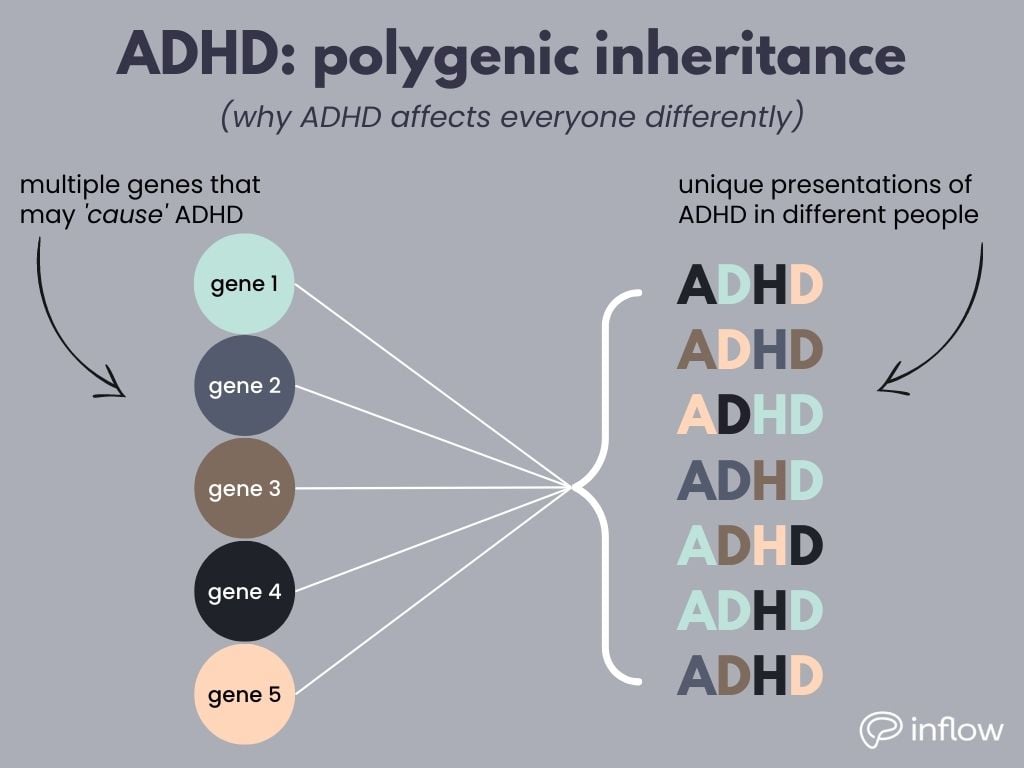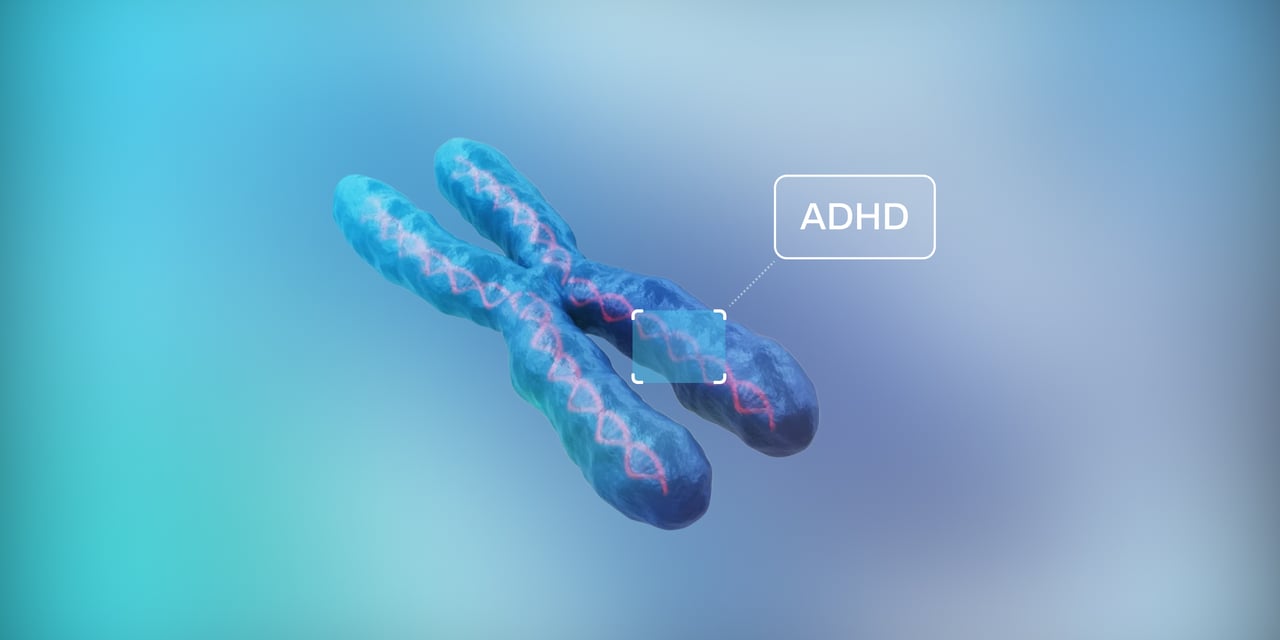It's 2022, and the causes of attention-deficit/hyperactivity disorder, or ADHD, are still being debated. Nevertheless, genetics is known to play a significant role in developing ADHD.
ADHD is believed to be highly heritable, which means it's likely to be passed to a child through genes. ADHD is also "polygenic," meaning there's no single "ADHD gene" but a combination that plays into the heritability of ADHD.1
It's ok if you're confused! I certainly needed guidance when researching this topic. Let's examine this closer.
Too long, didn't read
- ADHD is highly heritable; the likelihood of developing ADHD increases if parents or grandparents also have it.
- More than one gene can affect the likelihood of developing ADHD
- Genes aren't the only decisive factor; environmental factors play a significant role.
- Some important environmental risk factors include traumatic experiences, prenatal drug consumption, and stress.
- Eugenics is an important possibility to keep in mind as research continues.
ADHD and genetics
Before diving into the heritability of ADHD and how it's passed through generations, let's first establish why that's interesting.
Hypothetically speaking…
Imagine we could identify the genes that cause ADHD. This would allow doctors to screen for ADHD in early infancy and begin treatment as soon as possible. As a result, this could potentially reduce negative impacts that ADHD may have on their life.
Sadly, that's not how it works.
Science doesn’t work that way

Several genes (currently unknown) likely combine to create unique presentations among individuals, which is why ADHD affects everyone a little differently!
We haven't identified one or several genes that "cause" ADHD. Genes don't cause ADHD per se, but increase the likelihood of developing ADHD. This is called genetic causation; which provides a basis for probability estimations, not certainty.2
However, as of 2022, researchers are closer to determining the specific genes that make someone susceptible to ADHD. More than one gene likely leads to its development, which is why ADHD is thought to be "polygenic."
But there's something that could delay—or destroy—the progress of ADHD genetic research: a largely immoral concept known as eugenics.
Eugenics: the dangers of genetics research
If scientists can determine the genetic causation of ADHD, something like prenatal screening could lead to prenatal stigmatization.
We could take this idea even further by considering an extreme—but unlikely—outcome:
Eugenics - the idea of "purifying a population," i.e., forcing humans into selective breeding to eliminate undesirable traits. As mentioned, it's unlikely this could happen, but we can't rule it out entirely because it's happened before.
Why is ADHD highly heritable?
This question is more complex than you may think.
Let's assume a person inherits a combination of genes from their parents that are common among the ADHD population. Of course, we already know these genes make a person more susceptible to ADHD, but do we know that this person will absolutely develop ADHD?
No. There's a good chance they will, but it's not a guarantee. So, why would somebody with ADHD-susceptible genetics not develop ADHD?
Because there are other factors at play.
Other possible causes
Several studies observe the environmental influences on a child that lead to the development of ADHD.
(Disclaimer: the following examples come from scientific literature but are not necessarily our specific views. While we believe in science, we also know that some studies do not look at the whole picture, ultimately leaving room for unknown variables and stereotypical assumptions.)
- Prenatal stress of the mother, including alcohol and nicotine consumption during pregnancy3,4
- Exposure to certain chemicals in utero or as an infant or child5
- Childhood stressors related to parental relationship status, divorce, single parenting or strained inter-parental relationships6
- Childhood stressors related to a low socioeconomic status of the family7
- Maltreatment, abuse, trauma or low parental interaction quality5,6
All of the above are risk factors for developing ADHD. This could implicate that a person with a genetic predisposition for developing ADHD could grow up in a "perfect environment"—one without all of these factors—and never develop ADHD.
This is, of course, not to say that a child developing ADHD means there was a failure in parenting. But unfortunately, parents and guardians can't always control the environmental stressors their children are exposed to.
ADHD in the environment
Apart from undoubtedly strong genetic influence, another reason for ADHD "running in families" is being raised in an ADHD home. If the parents struggle with ADHD—even with effective coping strategies—the child experiences and observes habits and lifestyles of their ADHD parents.
Nature vs. nurture
There isn't one single identifiable cause for ADHD.
A particular combination of genes can make it more likely for someone to develop ADHD, but it doesn't guarantee it. What can be said for sure is that neither environmental factors nor genetics solely causes ADHD—a classic Nature vs. Nurture dispute.
What doesn’t cause ADHD?
Electronics and screens

Have you ever heard people swear that ADHD is more common because of TV, smartphones, and video games? Of course, some people get specific with their claims; for example, SpongeBob SquarePants is commonly blamed for "causing ADHD." But what does the science say?
Several studies have explored the correlation between TV (or video games, screen time, etc.) and ADHD. Their findings?
Inattentive symptoms sometimes worsen with increased screen exposure. That doesn't mean TV or video games cause ADHD.8,9
Red food dye

Some also claim that food additives (like corn starch and red food dye) cause ADHD.
However, the FDA (Food and Drug Administration) concludes that only in a limited number of "certain susceptible children" is there a connection between ADHD symptoms and color additives.
In other words, it's not statistically significant, which makes this untrue.
Vaccines

The belief that vaccines cause autism, a related condition of neurodiversity, has long been debunked. The same is true for vaccines and ADHD:
Vaccines have never, do not, and will never cause ADHD. (or autism)







